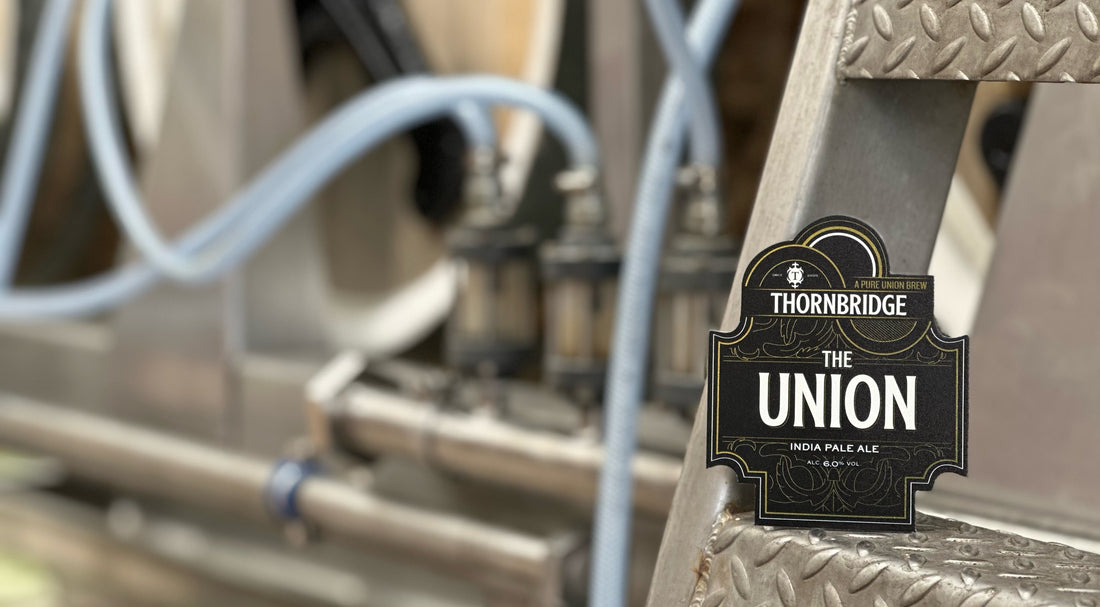
The Union IPA
Share
Following on from our first operation of our new Union system, where we used it to produce a batch of Jaipur, we’ve been able to sit down and discuss what we learned, how we might improve the process and most importantly, what we want to brew on it next. We’ve had some additional steel pipe added to allow for easier casting, plus some additional cooling piping to give us greater control over the attemperation of the barrels. But by and large, our first go was a great success and a fascinating learning curve.
While the first beer produced was always going to be Jaipur, our best-selling beer, our thoughts turned to what we could do next to really celebrate this iconic bit of kit that’s now unique to Thornbridge. We know the Union system of fermenting was once widespread across Great Britain by the mid-1800s, when British beer was famous across the world – beers like porter, stout and pale ales were the order of the day. The beers that the big Burton breweries such as Bass, Worthington and Allsops were famous for were their IPAs. Thus making a classic British-style cask IPA, around 6% ABV/1055 OG, using the very best ingredients we can get our hands on and then fermenting it in our new Union set, seems like a good idea. We’ll also brew a bottle conditioned version soon too, but we’ll make this 7% ABV. We’re not going to be tricked into writing about the contentious history of British IPA - malt and hops are of a completely different quality to what were available in those times, so we’ve put a recipe together that we think will make a superb, modern beer without worrying too much about the historical recipes.
For our base malt, we have used Maris Otter from Norfolk, where the sandy soil and maritime climate is perfect for growing this variety. The Maris Otter variety is 60 years old next year, which is quite unbelievable for a commercial barley variety these days, which rarely last 5-10 years before being dropped in favour of something else. I believe it’s the best pale malt you can buy as it makes consistently great beer, with a slight nuttiness and biscuit flavour that the modern varieties don’t have. We’ve also added a touch of Simpsons’ best Crystal malt to add a touch of colour and rounded sweetness and some of the special (and expensive) “Brewers’ Invert No.2” sugar from Ragus, which will add notes of caramel and toffee while helping to keep the beer’s body in check.
The all-important hops are British-grown Goldings and Northdown, which give us some gentle berry flavours and rounded, cedar-like hop aromas to balance the maltiness. The Goldings have been sourced from Hawkins farm in Herefordshire, sixth-generation hop growers who just won the Institute of Brewing and Distilling hop competition with a sample of their Harlequin. The Northdown, fresh from winning the Sandhurst cup at the Kent hop show in 2023, are grown at Gay Dawn Farm in Kent.
We’ve pitched two of our yeast strains, namely our fruity British cask ale strain and the California ale yeast, which is fairly neutral in flavour and ensured the attenuation we were looking for. Our water here in Bakewell is (thankfully) very soft, but Burton water is famously hard, so to emulate their water we’ve added plenty of Gypsum (Calcium Sulphate) to the brewing liquor. Probably not quite enough to get the famous ‘Burton snatch’ (a whiff of sulphur on freshly poured beer), but enough to the required crisp, minerally edge on the finish.
We brewed in our Riverside brew kit and then 16 hours later, we filled the feeder trough with the wort straight from the fermenting vessel, so the yeast could work its magic. From here it was another two weeks and then it was ready after fermentation and racking but again, we can’t wait to see what you think!
Written by Rob Lovatt, Head Brewer/ Production Director
